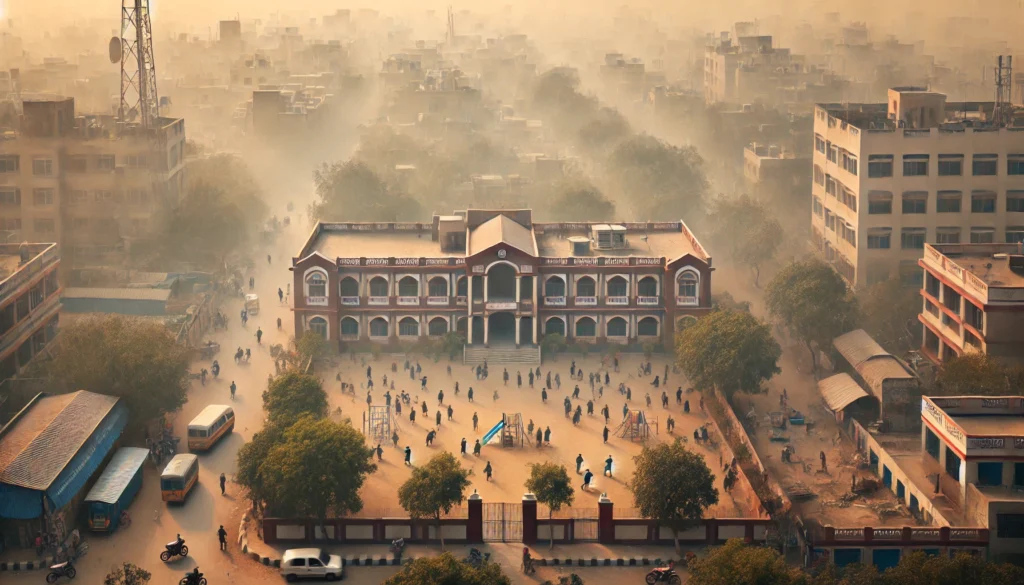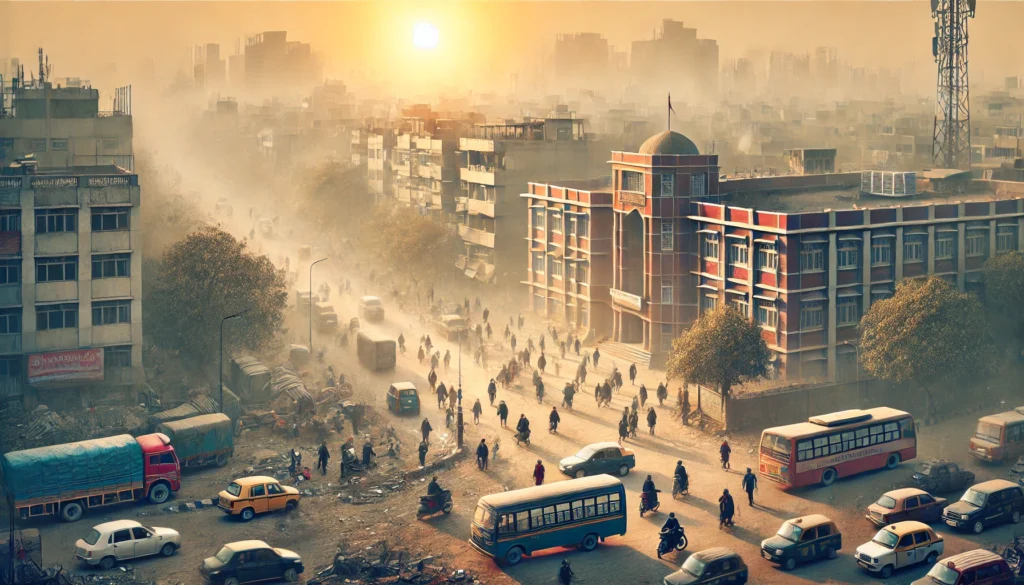Why Schools Are Closed?
The national capital region (NCR), which includes Delhi, Noida, and Ghaziabad, has been grappling with a severe air pollution crisis in recent years. During certain months, particularly in the winter, air quality levels in these cities dip to hazardous levels, posing serious health risks to the residents. Among those most vulnerable to the effects of this pollution are children, whose exposure to harmful pollutants can lead to long-term health complications. In response to this public health crisis, the question arises: will schools in these areas remain open next week amid worsening air quality? In this article, we will explore the impact of air pollution on school operations, the government’s approach, and what parents, teachers, and students can expect in the coming days.
Understanding the Air Pollution Crisis

Air pollution in Delhi, Noida, and Ghaziabad has been a perennial issue, worsening each year due to a combination of local factors and regional phenomena. During the winter months, a toxic cocktail of pollutants such as particulate matter (PM2.5 and PM10), nitrogen dioxide (NO2), and sulfur dioxide (SO2) creates a smoggy haze that envelops the cities. The phenomenon is exacerbated by stubble burning in neighboring states like Punjab and Haryana, which releases large quantities of smoke into the air.
Other contributing factors include vehicular emissions, construction activities, industrial pollution, and poor waste management. As temperatures drop, the pollutants get trapped near the ground, leading to hazardous air quality levels, sometimes reaching “severe” levels as per the Air Quality Index (AQI).
The Air Quality Index (AQI) categorizes pollution levels into six major bands, ranging from “Good” (0-50) to “Severe” (301-500). When air quality reaches the “Severe” category, it poses a significant threat to human health and can lead to respiratory problems, especially for vulnerable groups such as children, the elderly, and those with pre-existing health conditions.
Impact of Air Pollution on Children

Children are particularly vulnerable to air pollution. Their lungs are still developing, and their respiratory systems are more sensitive to harmful pollutants than adults. Exposure to high levels of air pollution can cause a range of health problems, including:
- Respiratory Issues: Shortness of breath, coughing, asthma attacks, and bronchitis are common among children exposed to high levels of pollution.
- Developmental Delays: Long-term exposure can affect lung development, leading to reduced lung function in adulthood.
- Increased Risk of Cardiovascular Disease: Early exposure to air pollutants can increase the risk of heart disease later in life.
- Reduced Cognitive Function: Emerging studies suggest that air pollution may also negatively affect cognitive development, impacting memory and concentration in children.
Given these serious health risks, schools in the region are often forced to reconsider their schedules and even close temporarily during periods of severe air pollution.
Government Response: Will Schools Be Closed?
Over the past few years, both the state and central governments have been under increasing pressure to tackle the growing air pollution problem, especially in cities like Delhi, Noida, and Ghaziabad. Several measures have been introduced, including:
- Graded Response Action Plan (GRAP): This is a set of guidelines issued by the Delhi Pollution Control Committee (DPCC) to address air pollution levels based on AQI readings. GRAP recommends actions such as shutting down construction activities, halting garbage burning, and limiting the use of diesel generators during periods of “severe” pollution.
- School Closures: During periods of severe air pollution, local authorities have closed schools or shifted classes online to protect children from harmful exposure.
- Odd-Even Vehicle Scheme: To reduce vehicular emissions, the Delhi government has periodically implemented the odd-even vehicle scheme, which limits the number of cars on the road based on whether their registration number ends in an odd or even digit.
The decision to close schools or modify school operations depends heavily on AQI levels. For example, in past years when air quality has dipped to hazardous levels, the Delhi government has declared holidays for schools or shifted to online classes to protect children’s health. The decision is often made on the advice of environmental experts and in consultation with health authorities.
Current Situation and What We Can Expect Next Week

As of late November 2024, Delhi, Noida, and Ghaziabad are experiencing an alarming rise in air pollution levels. According to the latest data, the AQI in some parts of the NCR has reached levels that are categorized as “severe,” with PM2.5 levels exceeding 300 micrograms per cubic meter, far beyond the safe limit of 60 micrograms per cubic meter.
Given this grim scenario, the authorities are likely to take immediate action. It is expected that schools may either:
- Temporarily Close: Schools may be closed for a few days, especially in areas with the most severe pollution levels. This will allow time for air quality to improve and prevent students from being exposed to harmful pollutants.
- Shift to Online Classes: If the air pollution levels do not improve, authorities may consider shifting to online learning, as has been done in previous years when pollution levels have been particularly high.
- Implement Outdoor Activity Restrictions: In cases where schools remain open, outdoor activities such as sports and physical education classes may be restricted. Students may be kept indoors, with air purifiers in classrooms to reduce exposure to pollutants.
The decision will be made by local education authorities in consultation with environmental experts, with the health of children being the top priority.
Challenges of Online Classes
While online classes provide a way to continue education without exposing students to harmful air pollution, they also present challenges. The shift to digital learning has been especially prevalent post-pandemic, but it remains a difficult transition for many. Some of the issues faced include:
- Digital Divide: Not all students have access to reliable internet or digital devices, leading to unequal access to education.
- Screen Time and Health: Prolonged screen time has been associated with eye strain, headaches, and a lack of physical activity. These health concerns may be compounded by the stress of coping with air pollution.
- Learning Loss: Online education is not a perfect substitute for in-person learning. Students may miss out on valuable social interactions, extracurricular activities, and hands-on experiences that are important for their overall development.
While these challenges are significant, they are being considered as part of the decision-making process by the government and school authorities.
The Role of Parents and Teachers
In times of severe air pollution, the role of parents and teachers becomes more critical. Teachers are tasked with adapting lessons to an online format while ensuring that students’ well-being is not compromised. Parents, on the other hand, need to take proactive measures at home, such as:
- Using Air Purifiers: Installing air purifiers at home can help reduce indoor air pollution, making it safer for children to study.
- Monitoring Health Symptoms: Parents should keep track of any symptoms related to respiratory distress, such as coughing, sneezing, or shortness of breath.
- Limiting Outdoor Activities: During periods of severe air pollution, parents should limit their children’s outdoor activities to minimize exposure to harmful pollutants.
Conclusion
The impact of severe air pollution on education in Delhi, Noida, and Ghaziabad cannot be understated. While the health of children is the primary concern, it is clear that the education system must adapt to these challenges. Schools in the region are likely to remain closed or shift to online learning if air quality levels do not improve in the coming days. Authorities are working tirelessly to address the root causes of pollution, but in the short term, it is essential that both the government and the public take necessary precautions to protect the health of students.
Ultimately, this situation underscores the urgent need for long-term solutions to combat air pollution, including stricter environmental regulations, greater investment in green technologies, and collective action from citizens and authorities alike. Until then, schools in Delhi, Noida, and Ghaziabad will continue to navigate the challenging intersection of education and public health.
Q&A Section
Why are Delhi schools closed?
Delhi schools have been closed due to severe air pollution, with AQI levels crossing the “hazardous” category in several areas. Under the Graded Response Action Plan (GRAP), Stage IV measures were implemented, which include shutting down schools to protect children from the harmful effects of air pollution
When will schools reopen in Delhi NCR?
Schools in Delhi, Noida, and Ghaziabad will reopen once air quality improves, and GRAP Stage IV restrictions are lifted. Authorities have shifted to online classes until further notice. Updates will depend on AQI levels and guidance from local administrations